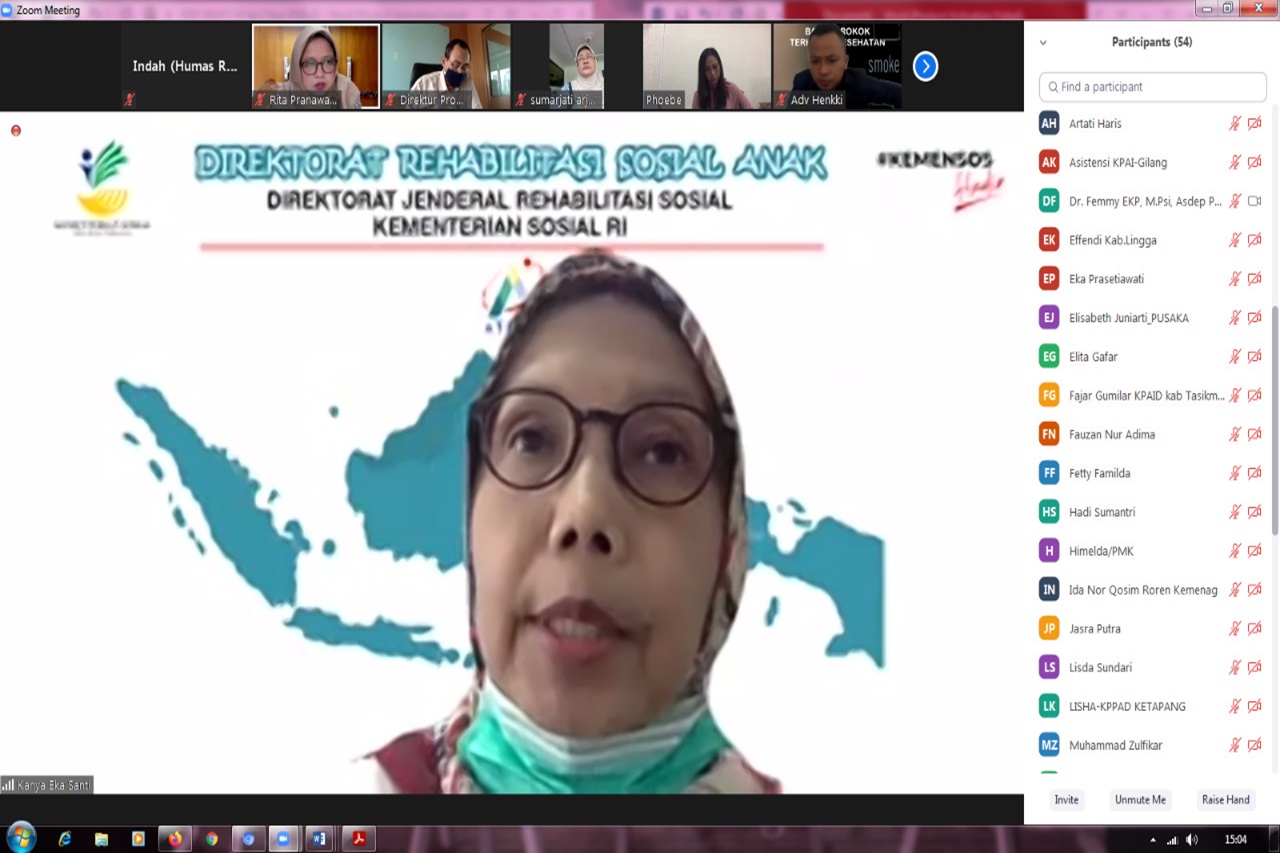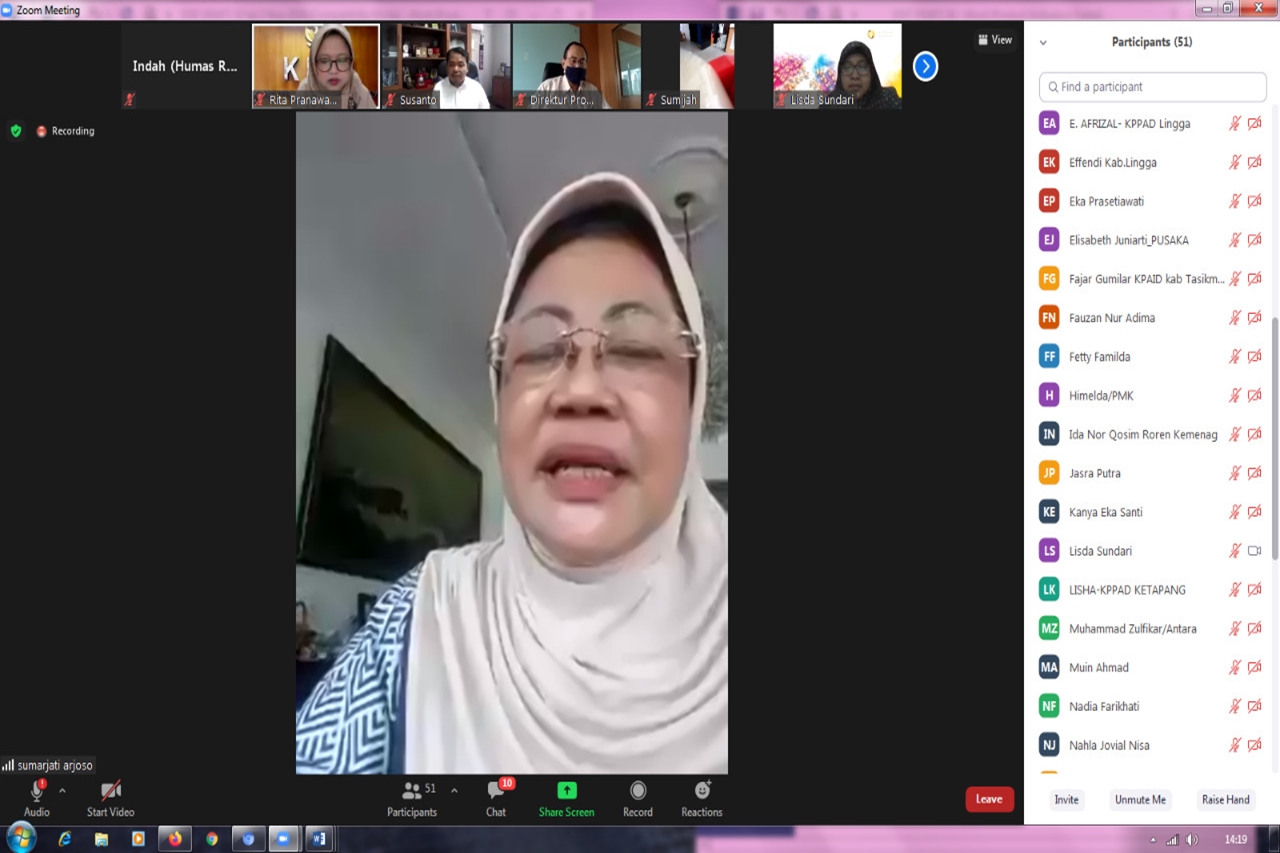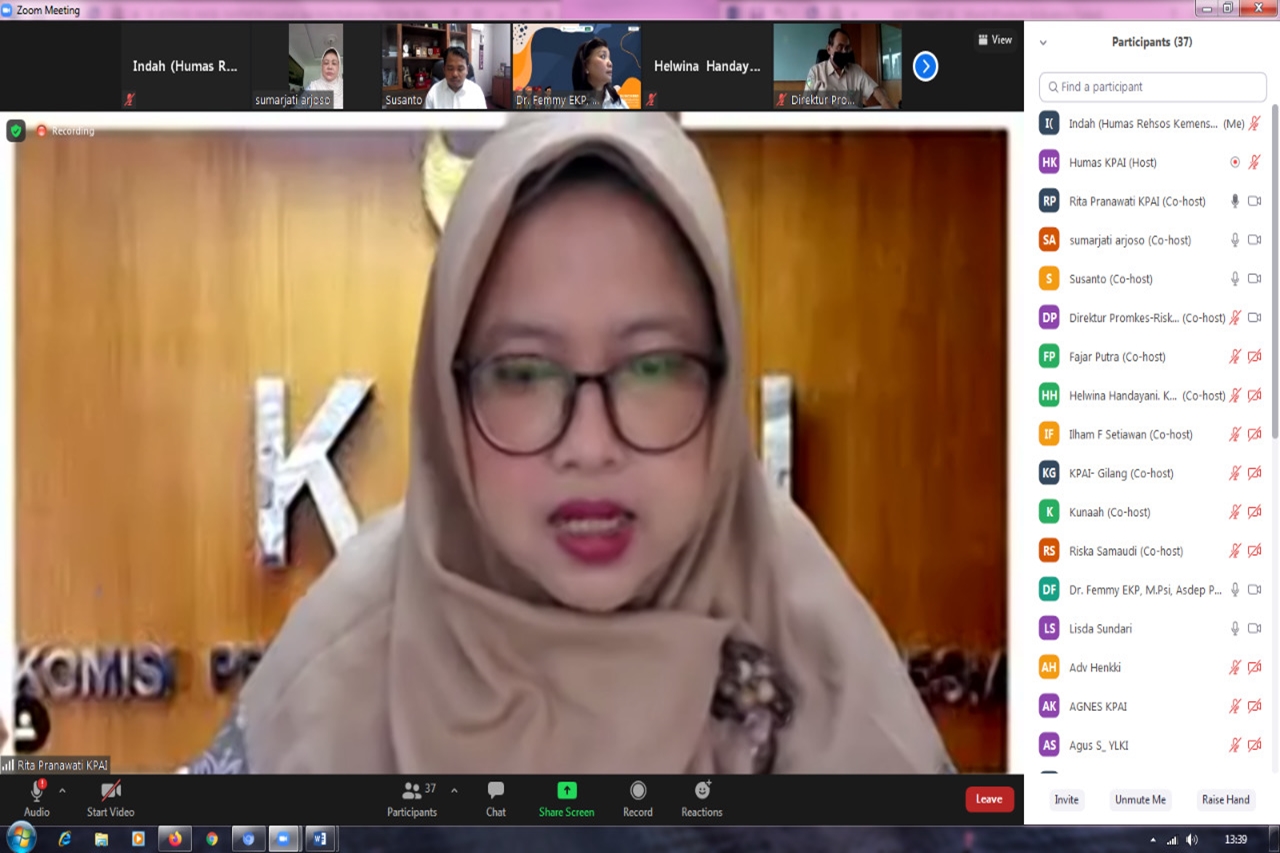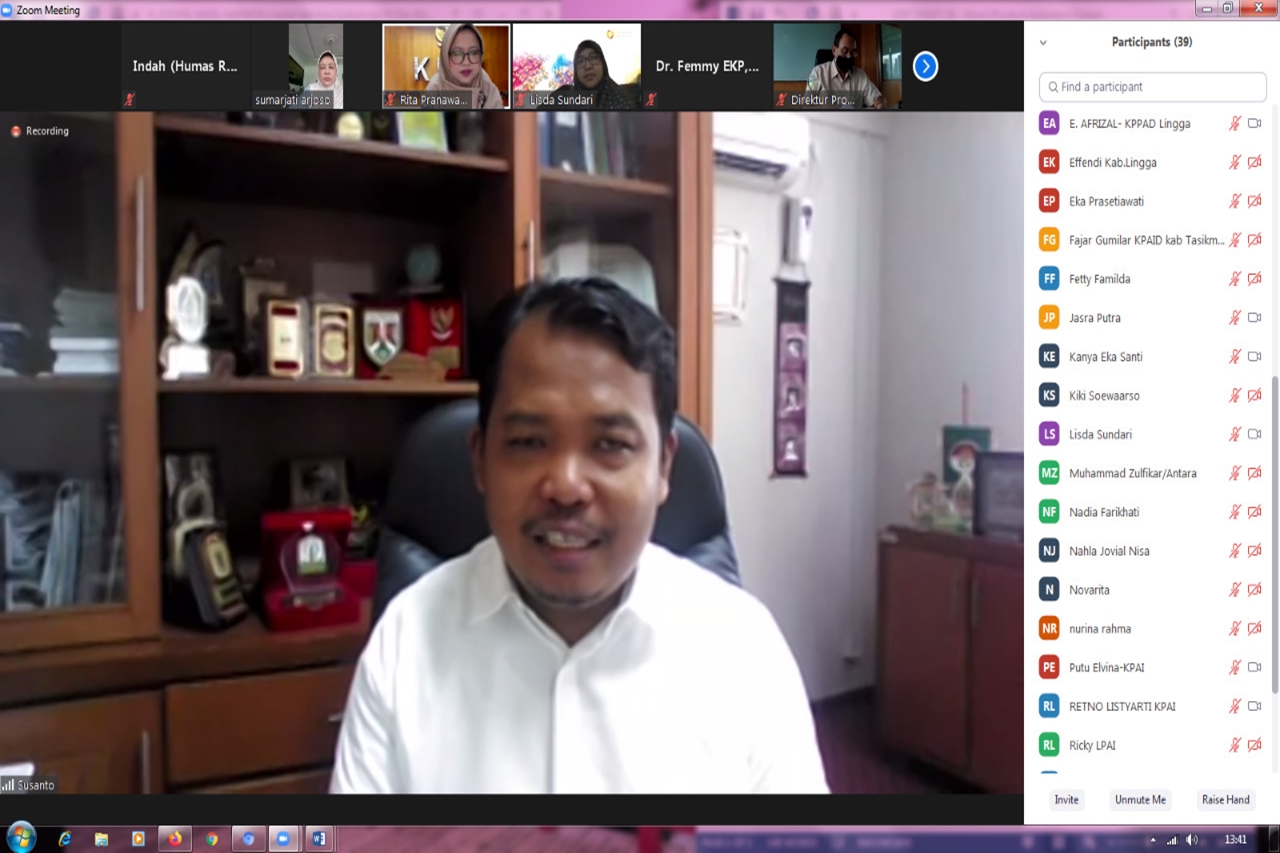Writer :
Humas Dit. Rehsos Anak
Editor :
Annisa YH
Translator :
Intan Qonita N
JAKARTA (November 2, 2020) - The Director of Child Social Rehabilitation, Kanya Eka Santi was present on behalf of the Director General of Social Rehabilitation as one of the active participants in the Coordination Meeting for Increasing the Effectiveness of Child Protection from Cigarette Exposure held by the Indonesian Child Protection Commission (KPAI).
The meeting, which was held virtually in order to increase the synergy of policy makers, was attended by 50 participants from various relevant Ministries/Institutions who are concerned about the dangers of smoking in children.
Also present at this activity were representatives from the Coordinating Ministry for Human Development and Culture, the Ministry of Health, the Ministry of Religion, the Ministry of Education and Culture, the All-Indonesian Football Association (PSSI), the Indonesian Child Protection Agency (LPAI) and representatives from community institutions such as Lanterns and Child Friendly Media.
When asked for his views on the Ministry of Social Affairs' efforts to prevent smoking among children, Kanya said that his party had actively coordinated with KPAI and other related institutions, preventing children from being exposed to cigarettes through Social Work Activities Goes To School (PGTS) and Family Child Strengthening Meetings (TEPAK), as well as Ngasuh Babarengan (Parenting Together) activity by utilizing the power of the community so that all communities around children remind each other if a child smokes.
“In an effort to reduce the prevalence of child smokers, we need to reorganize in terms of cigarette prices, cigarette excise and access to cigarette sales. The price of cigarettes in Indonesia is very cheap, even in cigarette shops, you can buy it in piece. This makes it very easy for children to get cigarettes. Moreover, if parents do not supervise their children, the child can become a smoker," said Kanya.
The Head of KPAI, Susanto said that the causes of the high number of child smokers in Indonesia include affordability in terms of purchasing, social environmental factors for children who are permissive to cigarettes, very easy access to cigarette purchases and increasingly dynamic promotion of cigarettes through digital media.
"If the government intervention is the same as the previous one, the increase in child smokers will increase even more. Today's meeting is intended to unite views so that we can produce recommendations regarding the protection of children from the dangers of smoking. We need to support the revision of Government Regulation No. 109 of 2012 concerning the Safeguarding of Materials Containing Addictive Substances in the Form of Tobacco Products," Susanto explained.
The meeting, which was held virtually in order to increase the synergy of policy makers, was attended by 50 participants from various relevant Ministries/Institutions who are concerned about the dangers of smoking in children.
Also present at this activity were representatives from the Coordinating Ministry for Human Development and Culture, the Ministry of Health, the Ministry of Religion, the Ministry of Education and Culture, the All-Indonesian Football Association (PSSI), the Indonesian Child Protection Agency (LPAI) and representatives from community institutions such as Lanterns and Child Friendly Media.
When asked for his views on the Ministry of Social Affairs' efforts to prevent smoking among children, Kanya said that his party had actively coordinated with KPAI and other related institutions, preventing children from being exposed to cigarettes through Social Work Activities Goes To School (PGTS) and Family Child Strengthening Meetings (TEPAK), as well as Ngasuh Babarengan (Parenting Together) activity by utilizing the power of the community so that all communities around children remind each other if a child smokes.
“In an effort to reduce the prevalence of child smokers, we need to reorganize in terms of cigarette prices, cigarette excise and access to cigarette sales. The price of cigarettes in Indonesia is very cheap, even in cigarette shops, you can buy it in piece. This makes it very easy for children to get cigarettes. Moreover, if parents do not supervise their children, the child can become a smoker," said Kanya.
The Head of KPAI, Susanto said that the causes of the high number of child smokers in Indonesia include affordability in terms of purchasing, social environmental factors for children who are permissive to cigarettes, very easy access to cigarette purchases and increasingly dynamic promotion of cigarettes through digital media.
"If the government intervention is the same as the previous one, the increase in child smokers will increase even more. Today's meeting is intended to unite views so that we can produce recommendations regarding the protection of children from the dangers of smoking. We need to support the revision of Government Regulation No. 109 of 2012 concerning the Safeguarding of Materials Containing Addictive Substances in the Form of Tobacco Products," Susanto explained.
The Director of Health Promotion and Community Empowerment of the Ministry of Health, Riskiyana was also present to explain the situation and condition of smoking prevalence in Indonesia. In her presentation, Riskiyana explained that the prevalence of underage smokers continues to increase from year to year.
“Based on the 2018 Basic Health Research, the prevalence of smoking in adolescents aged 10-18 years has increased from 2013 (7.20%) to 2018 (9.10%). If it is not supported by all sectors, the prevalence of smokers aged 10-18 years will increase to 16% in 2030," said Riskiyana.
Another resource person, Sumaryati Arsono, explained that the facts on the ground showed that many of the Family Hope Program (PKH) social assistance recipients whose family members were smokers, including children. This is very worrying considering that the aid funds should be used for family needs but are used to buy cigarettes.
“It is better if the recipients of PKH assistance are also required not to be allowed to smoke. This can help reduce the prevalence of smokers, especially those who are still children," said Sumaryati.
Responding to this, Kanya emphasized that the Ministry of Social Affairs ensures that PKH assistance is not misused to buy cigarettes, but to meet the needs of families, especially pregnant women and children. “PKH is a national program that contributes greatly to reducing poverty and stunting. Therefore, the Minister of Social Affairs always conveys messages and monitors so that PKH is right on target and has the right designation," explained Kanya.
PSSI representative Vivin Sungkono explained that football is one of the universal languages that the world community can understand. Therefore, WHO has made an MOU with FIFA for an anti-smoking or no-tobacco campaign. "We have done many things, both through campaigns on social media, sports activities, national and international events. This is mandatory. So far, PSSI has been running without using cigarette advertisements," explained Vivin.
"Regarding the mandatory FIFA, it is very good, meaning that the policy really supports children to be free from the dangers of smoking. Socialization about the dangers of smoking must continue to be intensified. Parents must be actively involved in preventing children from the dangers of smoking," said Kanya.
At the end of the event, all participants synergized to make recommendations as a result of the Coordination Meeting on Increasing the Effectiveness of Child Protection from Cigarette Exposure which consisted of supporting revisions to government regulations related to cigarettes in the form of a ban on promoting cigarette advertisements so that children are not susceptible to exposure to cigarettes, prohibiting the sale of cigarettes in sticks, regulating strictly the production, consumption and distribution of electronic cigarettes.
“Based on the 2018 Basic Health Research, the prevalence of smoking in adolescents aged 10-18 years has increased from 2013 (7.20%) to 2018 (9.10%). If it is not supported by all sectors, the prevalence of smokers aged 10-18 years will increase to 16% in 2030," said Riskiyana.
Another resource person, Sumaryati Arsono, explained that the facts on the ground showed that many of the Family Hope Program (PKH) social assistance recipients whose family members were smokers, including children. This is very worrying considering that the aid funds should be used for family needs but are used to buy cigarettes.
“It is better if the recipients of PKH assistance are also required not to be allowed to smoke. This can help reduce the prevalence of smokers, especially those who are still children," said Sumaryati.
Responding to this, Kanya emphasized that the Ministry of Social Affairs ensures that PKH assistance is not misused to buy cigarettes, but to meet the needs of families, especially pregnant women and children. “PKH is a national program that contributes greatly to reducing poverty and stunting. Therefore, the Minister of Social Affairs always conveys messages and monitors so that PKH is right on target and has the right designation," explained Kanya.
PSSI representative Vivin Sungkono explained that football is one of the universal languages that the world community can understand. Therefore, WHO has made an MOU with FIFA for an anti-smoking or no-tobacco campaign. "We have done many things, both through campaigns on social media, sports activities, national and international events. This is mandatory. So far, PSSI has been running without using cigarette advertisements," explained Vivin.
"Regarding the mandatory FIFA, it is very good, meaning that the policy really supports children to be free from the dangers of smoking. Socialization about the dangers of smoking must continue to be intensified. Parents must be actively involved in preventing children from the dangers of smoking," said Kanya.
At the end of the event, all participants synergized to make recommendations as a result of the Coordination Meeting on Increasing the Effectiveness of Child Protection from Cigarette Exposure which consisted of supporting revisions to government regulations related to cigarettes in the form of a ban on promoting cigarette advertisements so that children are not susceptible to exposure to cigarettes, prohibiting the sale of cigarettes in sticks, regulating strictly the production, consumption and distribution of electronic cigarettes.
In addition, recommendations that were also proposed in today's coordination meeting include strengthening the socialization of the dangers of smoking for children through schools, madrasas and re-activating the School Health Unit (UKS), strengthening smoking-free families including prospective brides, coordinating and advocating to the media to control children's exposure to tobacco products, and encourage regulation of smoke free sports for all sports through the Coordinating Ministry for Human Development and Culture and encourage the creation of a No Smoking Area.
Let's protect Indonesian children from smoking by strengthening the synergy of all parties and the community. Realize Indonesian children who grow up healthy and prosperous for a better future for the nation.
Let's protect Indonesian children from smoking by strengthening the synergy of all parties and the community. Realize Indonesian children who grow up healthy and prosperous for a better future for the nation.
Share :
 English
English
 Bahasa
Bahasa




